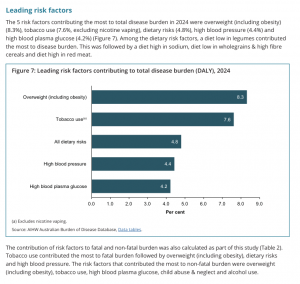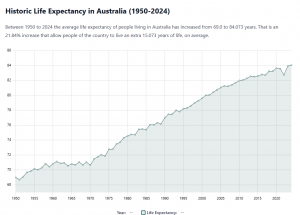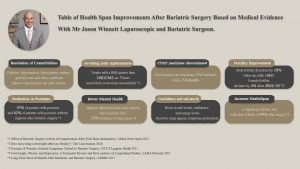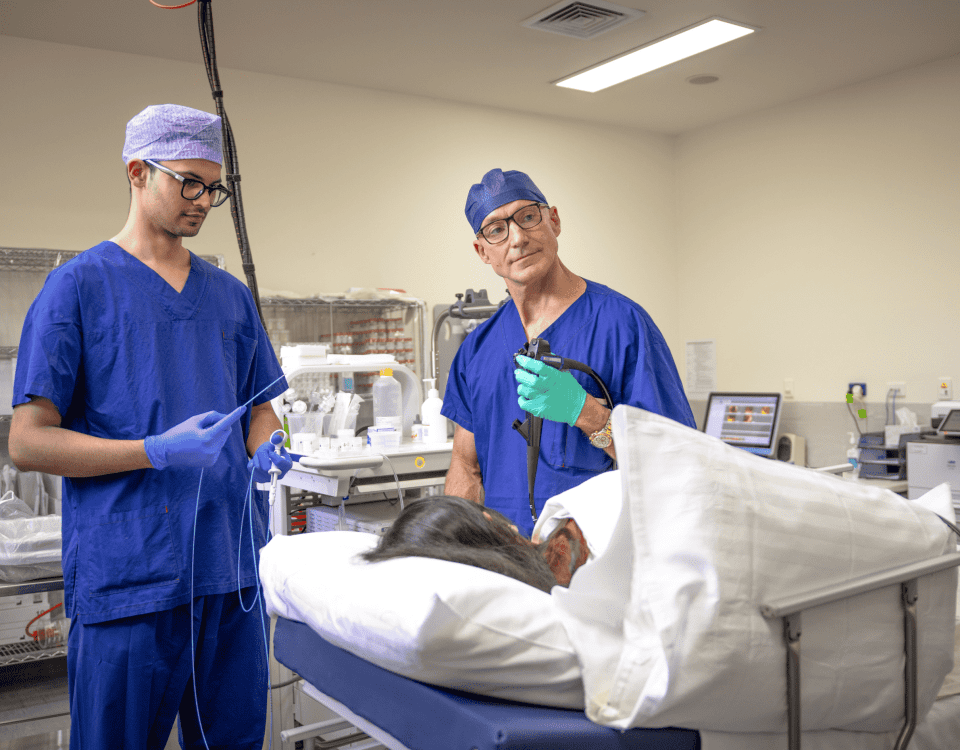
When we talk about longevity or ‘lifespan’, we tend to think about the number of years left to live.
But what is emerging as an equally important concept is ‘healthspan’*1, or how to add life to those years, says Mr Jason Winnett Bariatric and Endoscopic Surgeon Melbourne.
Winnett says that for patients, healthspan is about ‘playing with your grandchildren, rather than having them visit in an aged care facility”.
For GPs, the messaging is increasingly about ‘flipping the script’ to focus on health gains.
“With 32% of adults living with obesity in Australia, it is one of our most important health issues, and specialist GPs play a pivotal role in prevention and management,” Obesity management Specific Interest Group Chair Terri-Lynne South in the latest RACGP position statement on Obesity.*2
“We need to flip the script when it comes to public health messaging – it’s about gaining health, not just losing weight.”
The World Obesity Day*3 official statistics paint a disturbing picture on obesity globally.
- Childhood obesity is expected to increase 100% between 2020 and 2035
- The number of adults living with obesity is expected to double from 2010 to 2035.
Another AIHW 2024 study*4 shows that in Australia, obesity has now overtaken smoking as the leading disease burden nationally.
“For too long responses to obesity have been focused on individuals, rather than broader health systems, governments, media, and the environments we live in” says Mr Winnett.
“It is very much time to focus on the four pillars of increased ‘healthspan’ which are sleep, movement, exercise, and social life.”

The latest research from The Australian Institute of Health and Welfare paints a gloomy dataset for obesity disease burden in Australia.

You lose, you snooze: The Weight-Sleep Connection
“As a bariatric surgeon it is common for me to hear from patients who tell me they are sleeping upright in a chair to help them breathe,” says Mr Winnett.
Nationally, more than 58% of sleep apnoea is due to obesity according to the Australian Family Physician*5
However, weight loss after surgery reduces this pressure on patient airways, which can alleviate obstructive sleep apnoea symptoms in many cases. Many patients find they no longer need CPAP machines and experience more restful sleep.
The obesity joint epidemic
Analysis of data from the Victorian Population Health Survey showed that overweight individuals were 60% more likely to have arthritis and those who were obese had twice the risk*6.
According to the research printed in Arthritis and Rheumatism*6 obese people also suffer from hip arthritis and experience more pain, stiffness, and discomfort, affecting their quality of life. Bariatric surgery frequently reduces this.
Exercise
“Outside of weight loss, many studies show that exercise can not only help maintain weight but is also linked consistently to cancer recurrence*7, so this is an important third pillar in lifespan,” says Winnett.

Social Life
Two-thirds of Australian adults are overweight or obese, but obesity is still stigmatised, according to a national survey released in 2021 on weight stigma*8, which found that many overweight people were still perceived as lazy, unmotivated and unable to take care of themselves. The study found that 38% of people perceived obese bodies as ‘disgusting’.
“There is no doubt that to a certain extent, bariatric surgery and weight loss medications can help reverse this situation,” says Mr Winnett.
“Many patients find it easier to participate in social activities, hobbies and events, and consequently build stronger relationships and a more fulfilling social life.
“The good news is that the stigma is lessening. In this study 75% of Australians said that they would stand up for someone being shamed because of their weight and 79% of people believe the media should reflect Australians in all shapes and sizes.”
What Bariatric Surgery Can Really Do for Your Patients
This summary highlights the broad systemic benefits of bariatric surgery – from resolution of comorbidities to improved sleep, mental health, and reduced mortality risk.

Collaborating for Improved Healthspan
Focusing on health span can help patients lead fuller, more active lives. Obesity is a complex issue, and by addressing it through surgery, lifestyle changes, and support, we can make a meaningful difference. At the Winnett Specialist Group, we are committed to collaborating with GPs and healthcare professionals to provide the best care. If you’d like to discuss any aspect or explore collaboration, please feel free to reach out.

Mr Jason Winnett
Melbourne Laparoscopic and Bariatric Surgeon
P (03) 9417 1555 admin@winnettspecialistgroup.com.au
www.winnettspecialistgroup.com.au
Queens Terrace, 382 Victoria Parade, East Melbourne 3002
- Mayo Clinic Q and A: Lifespan vs. healthspan – Mayo Clinic News Network
- Australian Burden of Disease Study 2024, About – Australian Institute of Health and Welfare Obesity and smoking chart page 13
- AFP Obstructive Sleep Apnoea and Obesity
- Role of age, sex, and obesity in the higher prevalence of arthritis among lower socioeconomic groups: A population–based survey (Victoria)
- Physical activity and survival after breast cancer diagnosis Journal Of The American Medical Association 2005.



